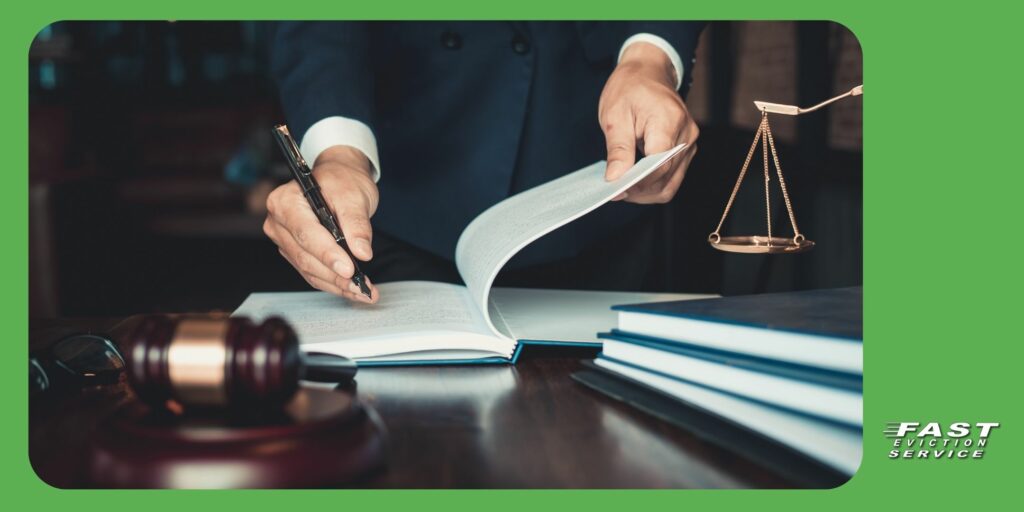Updated 04/08/25
As a landlord, there are moments when experience and common sense simply aren’t enough. Renting out property comes with legal responsibilities that, when mishandled, can quickly spiral into expensive and stressful situations. Whether you’re managing one unit or a portfolio of properties, knowing when to seek professional landlord legal help can be the difference between a small headache and a legal nightmare.

Many landlords ask, “Should I hire a lawyer for eviction?” It’s a smart question. The truth is, eviction is only one of many moments where the help of a landlord-tenant attorney can save your business, reputation, and bottom line. In this article, we’ll explore seven situations where legal support isn’t just helpful—it’s essential. And while not every challenge requires an attorney, you need to recognize the red flags and act fast.
Table of Contents
- Why Legal Help Is a Smart Investment for Landlords
- Evictions Gone Wrong: How a Lawyer Can Protect You
- Discrimination Complaints: What Landlords Need to Know
- Injury Lawsuits: When Tenants Blame You
- Dealing With Property Damage Claims
- Navigating IRS and State Audits as a Landlord
- When Can You Handle It Alone?
- Legal Costs vs. Business Protection: Making the Right Call
- Finding the Right Landlord-Tenant Attorney in Your Area
- How to Stay Out of Legal Trouble in the First Place
- Frequently Asked Questions: Should I Hire a Lawyer for Eviction?
Why Legal Help Is a Smart Investment for Landlords
Running a rental business might not feel like running a legal operation, but that’s exactly what it is. From lease agreements to habitability standards, every decision you make is tied to laws and regulations. And the cost of legal mistakes landlords make can be catastrophic.
A simple error in your lease could expose you to lawsuits. Mishandling a security deposit could mean losing triple the amount in court. When you consider the cost of losing one lawsuit, hiring an attorney suddenly becomes less of a luxury and more of a wise business move.
Legal guidance ensures that you’re not walking into a trap. It’s especially important when you’re dealing with issues like evicting a tenant legally or responding to a fair housing discrimination defense. The law is not designed to be intuitive, and courts won’t cut you slack just because you didn’t know.
Evictions Gone Wrong: How a Lawyer Can Protect You
Eviction is one of the most common legal tasks landlords face—and one of the riskiest. The rules around evictions are strict, especially in states like California. Miss one deadline, serve the wrong notice, or misstate your reason, and the tenant can stay longer while you rack up losses.
A landlord-tenant attorney can ensure every step is handled by the book. They understand court procedures, local laws, and the strategies tenants might use to delay the process. And if things get heated in court, you’ll want someone experienced by your side.
So, should you hire a lawyer for eviction? If you’ve never done it before, or if the tenant is contesting the case, the answer is yes. Legal mistakes can lead to delays, dismissed cases, and even countersuits.
Discrimination Complaints: What Landlords Need to Know
Fair housing laws are broad, and violations don’t require intent. A simple word choice in your ad or an unintentional comment during a showing can lead to serious accusations. If a tenant or applicant files a complaint, you’ll be expected to defend yourself.
Defending against a fair housing discrimination defense without legal help is a major risk. These cases often involve state and federal agencies, investigations, and the possibility of significant penalties. An experienced attorney can help you navigate investigations and protect your rights.
Besides that, having a lawyer review your policies and communication practices can prevent these issues from arising in the first place.
Injury Lawsuits: When Tenants Blame You
Imagine this: a tenant trips on a broken stair and claims you ignored their maintenance request. Now, you’re facing a personal injury lawsuit as a landlord.
These situations are high-stakes. If the court finds you negligent, you could be on the hook for medical bills, lost wages, and more. Even worse, your rental property insurance coverage may not fully protect you if you failed to maintain the property properly.
Injury cases are about documentation, timelines, and demonstrating that you acted responsibly. A landlord legal help specialist can defend your actions and limit your liability.
Dealing With Property Damage Claims
Sometimes, tenants damage your property—accidentally or deliberately. You might think withholding the security deposit is enough, but if the tenant disputes the charges, you’ll need to prove your case.
Property damage tenant claims can end up in small claims court, where documentation is key. An attorney can help you present evidence, respond to countersuits, and make sure your rights are upheld.
This is especially true if damage exceeds the deposit or involves criminal behavior. Having a legal ally gives you leverage and credibility.
Navigating IRS and State Audits as a Landlord
Taxes are a major part of being a landlord. From rental income to expense deductions, every financial record must be precise. If you’re selected for an audit, you need landlord IRS audit advice from someone who understands your business.
Accountants can help, but if things escalate, an attorney is your best defense. Especially when you’re facing penalties or allegations of fraud. The IRS has the power to freeze accounts, garnish wages, and seize assets. A good lawyer helps ensure that doesn’t happen.
Besides that, legal help can prepare you before an audit ever starts. Proactive advice saves time, stress, and money.
When Can You Handle It Alone?
Not every issue requires an attorney. Routine maintenance complaints, minor lease questions, or screening applicants are usually within your wheelhouse. The key is knowing where your comfort zone ends.
If a tenant threatens to sue, you receive a legal notice, or an agency contacts you, it’s time to bring in professional landlord legal help. Trying to DIY your way through serious legal matters is a mistake you can’t afford.
Legal Costs vs. Business Protection: Making the Right Call
Hiring an attorney might feel expensive. But the truth is, legal help is a form of business insurance. It’s about protecting your time, money, and reputation.
A single lawsuit can cost more than years of occasional legal consultation. And the peace of mind that comes with knowing your rights are protected? That’s priceless.
When comparing costs, consider what you’re really buying: prevention, defense, and guidance. Most landlords regret not hiring a lawyer after they’ve lost a case.
Finding the Right Landlord-Tenant Attorney in Your Area
Not all attorneys understand the landlord-tenant dynamic. Look for one with direct experience in rental property liability, eviction defense, and fair housing law.
Ask for referrals from other landlords, check reviews, and schedule consultations. A good attorney should communicate clearly, understand your local laws, and offer practical solutions.
In Southern California, Fast Eviction Service offers trusted, affordable legal help tailored to landlords. Whether you need to evict a tenant legally or defend yourself in court, our attorneys are ready to help.
How to Stay Out of Legal Trouble in the First Place
Preventing legal problems is always cheaper than solving them. Keep detailed records, use strong leases, respond to tenant concerns promptly, and stay informed about landlord-tenant law changes.
Training and education can also make a big difference. The more you understand your responsibilities, the less likely you are to stumble into legal traps.
Finally, establish a relationship with a landlord-tenant attorney before you need one. That way, when something goes wrong, you’re not scrambling—you’re already protected.
Frequently Asked Questions: Should I Hire a Lawyer for Eviction?
Do I always need a lawyer to evict a tenant?
Not always, but if the tenant contests the eviction or if you’re unsure about the legal process, it’s highly recommended. Mistakes can delay the process or result in the case being dismissed.
What can go wrong if I handle eviction myself?
Common problems include serving the wrong notice, missing deadlines, or violating tenant rights—all of which can cost you time and money.
How much does it cost to hire a landlord-tenant attorney?
Costs vary by region and complexity, but many law firms offer flat fees for standard evictions. It’s usually more affordable than losing a case.
Can Fast Eviction Service help with my case?
Absolutely. We specialize in helping landlords evict tenants legally and efficiently. Contact us today to learn more.





